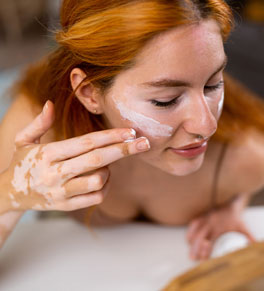Sun protection: recommended for all ages

Sun protection is always in season, no matter your age or the weather.
While social media may have some believing that sunscreen is dangerous or simply not necessary, UCI Health dermatologist Dr. Melissa Shive wants to set to record straight.
“Years of scientific evidence supports the benefits of sunscreen in preventing skin cancer,” she says.
Countering sunscreen myths
Although people of all ages may believe the myths about sun protection and sunscreen, she says, young adults are more susceptible to them because they’re often unaware of what sun damage looks like or how to prevent it.
In fact, a recent study published by the American Academy of Dermatology (AAD) found that 28% of 18 to 26-year-olds surveyed didn’t believe that suntans could lead to skin cancer and 37% only wore sunscreen when asked to. Millennials, those born between 1981 and 1996, are also susceptible: 17% of those surveyed didn’t know that tanning caused skin cancer.
The fact is, most skin cancers and 90% of premature skin aging is related to exposure to ultraviolet light from the sun or indoor tanning. And much of the damage is done years before it is visible.
Skin cancer is the most common U.S. cancer, with one in five Americans expected to develop the disease in their lifetime, according to the AAD. Each year, more than three million Americans are diagnosed with basal cell and squamous cell skin cancers. Nearly 200,000 cases of melanoma, the deadliest skin cancer, are also reported annually.
Sun safety tips
The best prevention, Shive says, is blocking and avoiding the sun's ultraviolet rays as much as possible.
It’s never too early to start practicing these sun protection habits.
- Apply sunscreen liberally and frequently. Shive recommends generously applying a broad-spectrum, water-resistant sunscreen of at least SPF 30 every day before leaving your house. While outdoors, apply it every two hours or more often when sweating or swimming.
- Wear sunscreen in all weather. Sunscreen is necessary even on overcast days because the sun’s rays can still penetrate the clouds. Mineral-based sunscreens with zinc oxide or titanium oxide are the most protective and less likely to irritate the skin.
- Stay in the shade. This is especially important between 10 a.m. and 2 p.m., when the sun is at its peak, Shive says.
- Cover up. Wear long sleeves, long pants and a wide-brimmed hat while you’re out in the sun. Also, consider clothing with an ultraviolet protection factor (UPF) rating for an extra shield.
- Protect your eyes. Exposing your eyes to the sun can lead to ocular melanoma, eyelid cancers, inflammation of the cornea and other problems. Wearing sunglasses that block 99% to 100% of UV rays can protect your eyes by screening out 75% to 90% of visible light.
- Monitor your skin. Most moles are nothing to worry about. However, moles that are asymmetrical, have an uneven border, are a strange color, bigger than the size of a pencil eraser, or changing should be evaluated by a dermatologist.




